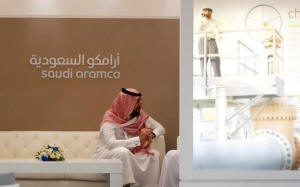|
In Aramco IPO pitch,
Canada plays up its natural resources expertise
 Send a link to a friend
Send a link to a friend
 [May 27, 2017]
By Alastair Sharp [May 27, 2017]
By Alastair Sharp
TORONTO (Reuters) - The Toronto Stock
Exchange's efforts to win a slice of the massive Saudi Aramco public
listing plays up the country's deep experience in natural resources as
part of a broader offer to help the kingdom with its shift away from oil
dependence.
In pitch documents obtained by Reuters, the TSX talks up "a customized
regulatory environment for resource issuers", its leading position in
oil and gas equity capital raising, and strong trading interest from
outside the country.
The Canadian pitch is also broader than just for a slice of the Aramco
IPO. On several trips to the kingdom, the most recent in late March, TMX
executives have been joined by senior executives from some of the
country's biggest banks, brokerages and other financial players as
Canada Inc seeks a role in delivering the kingdom's broader Vision 2030
plan.
One source directly involved in the Canadian pitch told Reuters they are
focused on convincing the Saudis that Canada excels in 10 of the 12
areas they have targeted for development under that plan, including in
mining and infrastructure. The source declined to be named due to the
sensitivity of the matter.
"We feel that we have put TMX and Canada's best foot forward and we
continue to promote our strengths in pursuit of business opportunities
in the region and around the world," TMX said in a statement.

But its best chance of winning a part of the biggest IPO ever, expected
to raise about $100 billion as early as next year, may lie in its
geography and geopolitics, securities lawyers say.
While the exchange, owned by the TMX Group Ltd, is widely considered an
underdog in a race that has also excited larger exchanges in London, New
York, Tokyo, Hong Kong and Singapore its case could be bolstered by a
recent change in U.S. law that allows those affected by the September
11, 2001 attacks to sue the Saudi government, they said.
"We are inoffensive from a political perspective," said Sarah Gingrich,
a Calgary-based partner at Fasken Martineau, who has previously worked
in Dubai with Saudi clients for international law firm Freshfields.
That law, the Justice Against Sponsors of Terrorism Act, came into
effect in September, after the U.S. Congress overrode a veto by former
President Barack Obama.
A group of insurers has since renewed a $6-billion lawsuit against the
kingdom, seeking to hold it responsible for business and property damage
as a result of the attacks, in which Saudi has long denied involvement.
In a March 17 interview with the Wall Street Journal, the Saudi energy
minister, Khalid al-Falih, said the so-called "terror law" is one
consideration in the country's decision on whether to list in the United
States.
Falih, who is Aramco's chairman, declined to comment on the specifics of
the IPO process at a recent news conference in Riyadh, citing legal
restrictions. However, he said the Saudi government still intended to
list Aramco in 2018 and that the preparations were on track.

[to top of second column] |

A Saudi Aramco employee sits in the area of its stand at the Middle
East Petrotech 2016, an exhibition and conference for the refining
and petrochemical industries, in Manama, Bahrain, September 27,
2016. REUTERS/Hamad I Mohammed

It was not clear if the issue was discussed during U.S. President Donald
Trump's recent visit.
A spokeswoman for the NYSE, which sources have said planned to visit
Saudi soon after Trump's visit, declined to comment on their efforts to
win Aramco's business.
Nasdaq, which is a technology partner to Saudi Arabia's exchange, is
also pitching for the listing, while the London Stock Exchange is
working on a completely new type of listing structure to woo Aramco,
Reuters has reported.
SMALL MARKET, BIG ENERGY FOCUS
Canada-listed oil and gas companies raised 22 percent of global energy
financing over the past five years, the TMX pitch documents show, second
behind the NYSE's 44 percent.
The documents put Canada in third place behind Chinese and Hong Kong
exchanges, and the United States for total capital raised in 2016,
noting that TSX-listed companies raised 28 percent more than
fourth-placed LSE.
They say more than 40 percent of TSX trading originates outside the
country and that bid-ask spreads, a key measure of liquidity, are among
the lowest in the world.
Still, while Canada boasts significant expertise in oil and gas
financing and strong interest from both institutional and retail
investors, it is dwarfed by the much larger U.S. market.
The oil and gas companies listed on its main TSX exchange and the junior
TSXV have a total market capitalization of C$325 billion ($239 billion),
TMX says.
By comparison, the New York Stock Exchange says its oil and gas
companies - which include super majors ExxonMobil Corp, Chevron and
secondary listings for Royal Dutch Shell and Total - are worth $3.3
trillion.

Neither the source in the TMX delegation nor the external lawyers said
listing and regulatory requirements would prove much of an obstacle to a
Canadian listing, especially if it were to be a third or fourth option.
But Canada would only find a way in to the action "if their (Aramco's)
bankers think they will get sufficient enough market interest here that
it will help promote the stock price and give them some liquidity and
trading," said Darrell Peterson, a partner with Bennett Jones in
Calgary.
(Reporting by Alastair Sharp; Additional reporting by John McCrank in
NEW YORK, Reem Shamseddine in RIYADH; Editing by Denny Thomas/Nick
Zieminski/David Clarke)
[© 2017 Thomson Reuters. All rights
reserved.] Copyright 2017 Reuters. All rights reserved. This material may not be published,
broadcast, rewritten or redistributed. |